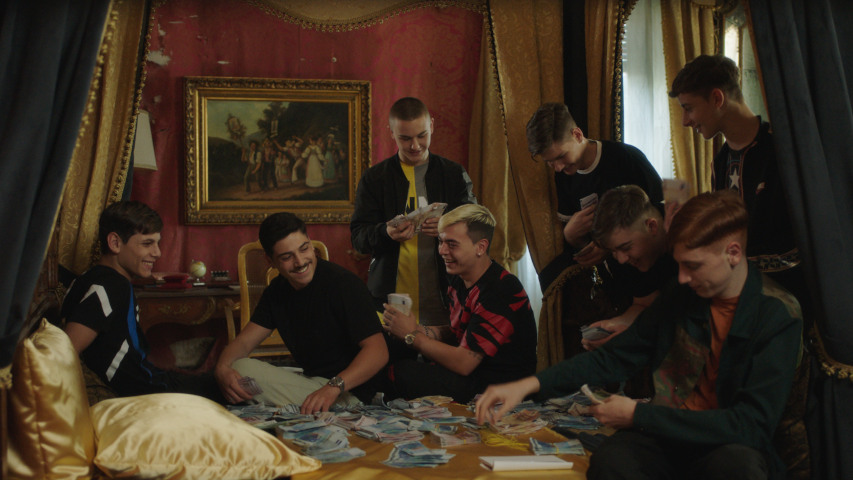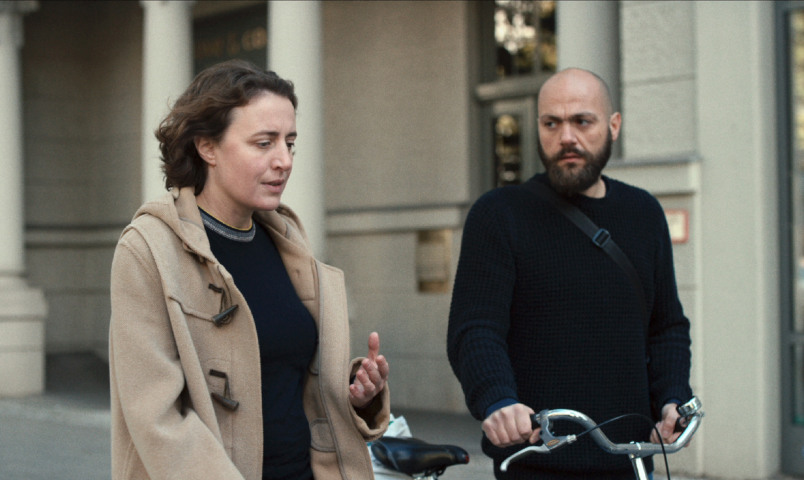Berlinale 2019 – Day 6: Trash From Germany, Italy Reclaiming the Mafia, and Nobody’s Going to Syria
- Christian Hain
- Feb 13, 2019
- 6 min read
Updated: Mar 23, 2020
(Berlin.) Angela Schanelec’s I was at Home, But starts as a silent movie without intertitles or music. As soon as there is dialogue, you miss that part. Dialogues that could be taken from a language course for beginners, in the style of 'Hello. My name is _. I want to buy this bicycle. I like it very much', recited by random people who never in their life have wasted a single thought on taking acting classes, or acting in general. Recited, as if read aloud from a book, a book that the reader neither likes nor understands. This actually makes sense: we should assume, they’ve read the “script” before shooting this “film”. When walking out - I’m sorry, but I couldn’t stand this #+!@ for more than fifty minutes of which about forty dealt with the acquisition and subsequent return of a bicycle (the seller was speaking through a voice prosthesis, because. This is horrible, and it sounds like a didgeridoo), a woman leaving at the same time – the doors hardly stayed close for more than two minutes at a stretch - told me, a friend of hers had a small part in it, but she just could not make herself stay. I asked, whether her friend was a trained actor, and to my astonishment she answered in the affirmative. I still don’t believe it. Neither that most members of the cast are actually seasoned theatre stars (at least they've been until now). There’s even a name for this - the Germans are masters in waste separation – which is “Berlin School”. I am no film scholar, but I know that the schools of Berlin count among the worst in Germany. Having graduated from a Berlin High School, you can count yourself lucky, if you’re able to spell your name and make no more than two or three mistakes, or so they say. Is this "Berlin School" supposed to be a Brechtian tradition, alienation effect &ct? But Brecht knew to write phrases surpassing A2 level (CEFR)!
Another colleague later told me, Schanelec freaked out at the press conference, because she did not like a question. This is no surprise: I guess, she knows what a piece of ---, what a mess this film is.
You really want to hear more? Fine: There’s a mother and her sad son, a bunch of worried teachers, and an elementary school class rehearsing a classical piece. Ah no, the children only recite a classical piece (to my shame I was not able to identify it) wherever they stand or go, in class or without. I did not, no: I could not wait to learn what sort of issues the boy had exactly. Perhaps another system crasher? A victim of some sinister tragedy? I’ll never know, but I don’t care. I’d rather stare at a nude pic of Angela Merkel for twenty-four hours on end than watch one more minute of an Angela Schanelec film. Language schools use film clips too, lessen “The Bicycle”: Hello. My name is___ This is a bicycle. I like the bicycle. I want to buy it. Maybe she could go looking for a job there.
One question remains: What thoroughly dysfunctional system of networking and tax write offs makes it possible, that films like this a) exist, b) are shown at Berlinale, and c) even in competition (not in a special "quarantine/oddities" section, there are so many sections at Berlinale)? And by what means was Franz Rogowski tricked into playing an extra here?
WArts Verdict: Imagine Angela Schanelec and Philip Gröning doing a film together. A match made in hell, and it’d take a John Yoo to defend it from the Geneva Convention (remember yesterday’s Vice?). If only I’d stayed at home, no “but”.
They’ve had an agreement: The best Westerns are Italian, and America takes care of the Mafia. But the old ways no longer hold sway and with Piranhas, Italy is reclaiming the mafia movie. Under the guidance of anti-mafia writer Roberto Saviano, Claudio Giovannesi directs one of the best films in the genre since Goodfellas. His Godfather is no Scar- but a babyface killer: Meet Nicola, fifteen years old and leader of a gang, that with the help of more seasoned Mafiosi – there is an abundant supply of those in the city – takes over “their” Neapolitan neighbourhood.
Inevitably, you will check for references to the classics, in a wedding scene where all the bosses attend, even think: “now here's lacking a banner: ‘Friends of Italian Opera’”, but otherwise best lean back, grab your seat rests, and enjoy. Poverty breeds crime, and boys just wanna have fun (and money). They will “do no harm” as they frequently assure – in the beginning at least.
Piranhas is a little masterpiece, a masterpiecettino, eh? From beginning to end, it feels thoroughly authentic, even – and especially – when things do not go according to plan, thus Nicola’s first attempt at chasing the old gang away but the only gun jams.
The main difference to American mafia movies is not a lesser degree of glorification – Nicola is at least as good a poster boy as Tony Montana – but the need for director and crew to justify themselves. At the press conference, they had to explain, how the film is meant for a warning, maybe even an explanation of what is going on. - Stronzo ragazze, theez eez a fiilm! Most members of Nicola’s gang - he himself is played by professional actor Francesco di Napoli who also grew up in Napoli – are sixteen to twenty year old chefs and hairdressers from these very neighbourhoods. They got asked to stand up one after another, and assert how much they loathe the criminal ways, and how bad all kind of violence is. I so much wished for the last in line to say: “Hi, I’m ___, and I want to be the capo dei capi.” Would have been fun.
Needless to say, their performance is better than anything seen in I Was At Home, But.
WArts Verdict: This is an offer, the jury cannot refuse. One bear should go to Napoli at least, capiche? Grazie mille, Signore Giovannesi!
Farewell To The Night by André Téchiné (who, by the way, more and more looks like Woody Allen’s lost twin brother - must be the glasses) features the great Catherine Deneuve as a grandmother who is confronted with a very contemporary problem (or is it)? Muriel lives in French- (“-occupied”, as certain Catalunyans would add) Catalonia, breeding horses and cherry trees. Her daughter died in a diving accident several years ago and her son-in-law lives with his new family on Guadeloupe. Their son who has been close friends with an Arab girl since early childhood, comes visiting before, as he claims, travelling to Canada for work (Montréal – fais gaffe au Ghost Towns!). The true destination is Syria, he’s lately become a Mohammedan (what exactly is wrong with that expression?), converted by that girl and the internet. She seems sort of a contradictory character: not wearing a veil, yet when they go swimming, she prefers a feminist bathing suit, and at her workplace in a nursing home refuses to wash the male residents or even wear short sleeves according to the sanitary regulation. She nevertheless gets a promotion, that’s tolerance.
Their supposed travel companion is a black guy: Muslim fundamentalism surpasses ethnic borders seems to be the message here. Discovering her grandson’s plan, Muriel takes to extraordinary measures. Farewell to the Night is a serious movie, and a good one.
The phenomenon might not be as new as everybody’s claiming, in the 1960s and 70s, friends of Mme Deneuve used to leave their home for an alien religion as well, heading a little further east for some guru or other in India (later, others went to war for different creeds, the comrades in Nicaragua for instance, not to mention countless more historic examples). "Just let them go, and keep dropping those bombs" would be a pragmatic, yet rather unpopular, advice. The film tries to at least mention their motives, and some of them sound not completely wrong, but adopting a murderous doctrine from another part of the world just is not the best idea. At all. Better lead your gang to glory in Napoli, er, no, don't do that either!
WArts Verdict: Difficult. A good film, but somehow not award-worthy.






Comments